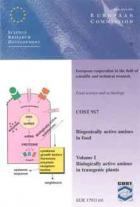
Bioactive Micronutrients in Mediterranean Diet and Health

Social Shaping of Technology: the Impact of the Social Environment on the Creation and Diffusion on Technologies - Social Shaping of Telematics and Rural Development - Report 1

Biogenically Active Amines in Food Vol III - Biologically Active Amines in Food Processing and Amines Produced by Bacteria and Polyamines and Tumor Growth

Governance of Public Sector Organizations - Proliferation, Autonomy and Performance
- Author(s): P. Laegreid & K. Verhoest (Eds)
- Publisher(s): Palgrave Macmillan
- http://www.palgrave.com/products/title.aspx?pid=380589
- ISBN/ISSN: 978-0-230-23820-6
Governance of Public Sector Organizations examines recent changes in central governmental administration in contemporary democracies by focusing on organizational forms and their effects. There is a considerable need for such knowledge in a period when governments are constantly restructuring their administration. This book studies and explains how New Public Management (NPM) and post-NPM reforms affect the organizational proliferation and specialization, as well as the autonomy and control of central agencies. New empirical data sheds light on the effects of these changes on organizational performance. The book describes how ‘whole-of-government’ initiatives with emphasis on reassertion of the centre and horizontal coordination supplement NPM reforms, producing increased layering and complexity in government organizations.
The contributors to this volume examine agencies in Australia, Canada, the UK, Hong Kong, Norway, Germany, the Netherlands, Switzerland, Belgium, Italy and Hungary. By combining survey, mapping and case study methodologies, they show that structural, cultural, task-related and historical features interact in shaping organizational reforms.

European Concerted Action 503, Powder Metallurgy - Powder-Based Material
- Pages: 296
- Author(s): R. Telle
- ISBN/ISSN: 92-827-9816-X
Volume V: Ceramics for High-Tech Applications

The Future for Sustainable Built Environments with High Performance Energy Systems
- Author(s): D. Schmidt (Ed)
Proceedings of the Conference held on 19th to 21st October 2010 in Munich, Germany

Children's Welfare in Ageing - Volume I
- Pages: 457
- Author(s): A-M. Jensen, A. Ben-Arieh, C. Conti, D. Kutsar, M. N.Ghiolla et al.
- Publisher(s): Norwegian Center for Child Research
- http://www.svt.ntnu.no/noseb/costa19/
- ISBN/ISSN: 978-82-7816-044-2
The new precariousness of the welfare state and the growing influence of the market, are challenging children’s life worlds, their everyday lives in families, schools, kindergartens and leisure areas. Demographic changes are leaving children vulnerable in the competition for public resources, access to space and use of time. Children are marginal at the big stage of political and economic actors. They do not have strong interest group to defend their rights to resources. But societies can not do without children’s contributions to society. Broad social changes call for deeper analyses as to the cultural blindness to children’s input to the societal fabric, and their consequences for children. These country studies explore children’s welfare from available sources across European countries. Three areas are highlighted: material welfare, access to space and use of time, and children’s rights and discourses.
Children’s Welfare in Ageing Europe is a result from an international scientific network within COST under the European Science Foundation. The network started in 2001 and includes child researchers in social sciences from twenty European countries.


